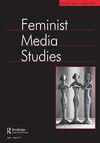Women’s affective labor in the Red Army’s war propaganda in the early 1930s
IF 1.7
2区 文学
Q2 COMMUNICATION
引用次数: 0
Abstract
This paper demonstrates that women’s affective labor was widely and deeply appropriated in the Red Army’s war propaganda in the early 1930s. This appropriation allowed women to emerge as free human...20 世纪 30 年代初红军战争宣传中的妇女情感劳动
本文论证了 20 世纪 30 年代初红军在战争宣传中广泛而深入地利用了妇女的情感劳动。这种利用使妇女作为自由人出现......
本文章由计算机程序翻译,如有差异,请以英文原文为准。
求助全文
约1分钟内获得全文
求助全文
来源期刊

Feminist Media Studies
Multiple-
CiteScore
3.50
自引率
17.60%
发文量
159
期刊介绍:
Feminist Media Studies provides a transdisciplinary, transnational forum for researchers pursuing feminist approaches to the field of media and communication studies, with attention to the historical, philosophical, cultural, social, political, and economic dimensions and analysis of sites including print and electronic media, film and the arts, and new media technologies. Feminist Media Studies especially encourages submissions based on original, empirical inquiry of the social experiences of audiences, citizens, workers, etc. and how these are structured by political, economic and cultural circumstances. The journal invites contributions from feminist researchers working across a range of disciplines and conceptual perspectives. Feminist Media Studies offers a unique intellectual space bringing together scholars, professionals and activists from around the world to engage with feminist issues and debates in media and communication. Its editorial board and contributors reflect a commitment to the facilitation of international dialogue among researchers, through attention to local, national and global contexts for critical and empirical feminist media inquiry.
 求助内容:
求助内容: 应助结果提醒方式:
应助结果提醒方式:


